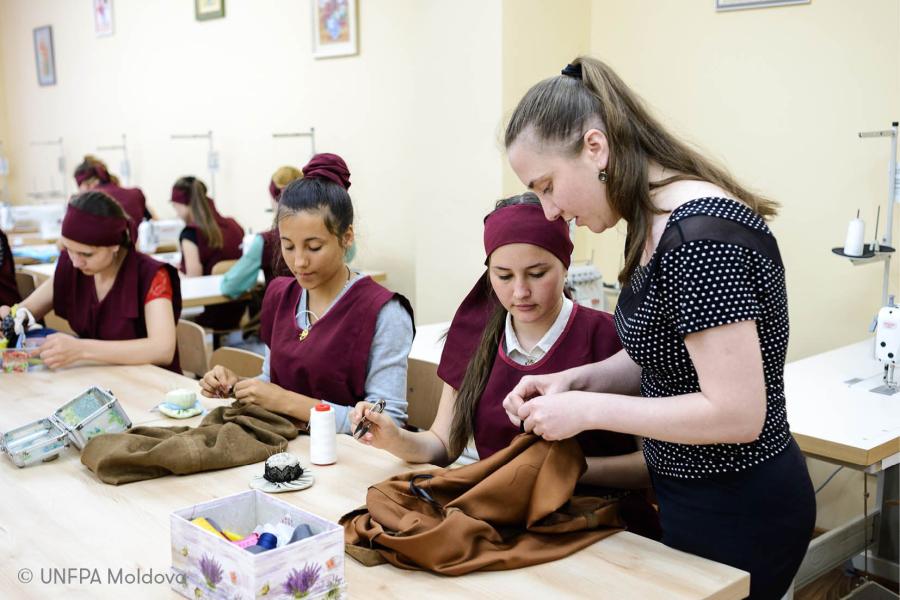Students from vocational schools will be better prepared for adult life and job market through life skills education
02 July 2020
More than 6,000 students from 12 vocational education institutions (VET) across Moldova will have the chance to address their critical needs for life skills development.The empowerment of the girls and boys is set to be the result of a United Nations Population Fund (UNFPA), Austrian Development Agency (ADA) and the Minister of Education, Culture and Research(MoECR) joint project launched today during a virtual conference.

“Access to education and employment for young people is a priority for the MoECR and with donors support Moldova has already achieved important results in capacitating the VET institutions and staff. Nevertheless, statistics prove that the investments in VET do not reap all the benefits possible without a concurrent investment in reducing risky behaviors and negative health social outcomes that can interrupt education or early professional life,” stated Igor Șarov, Minister of Education, Culture and Research, during the event.
The project will address various challenges faced by the young people engaged in the VET system concerning their employment or self-employment from the perspective of life skills-based health education. It proposes a concurrent investment in life skills education, in creation of safe spaces at school and at the workplace, and in empowering young people to develop healthy behaviors, address gender stereotypes and prevent gender-based violence. This is also a priority in the Moldova Vocational Education and Training Development Strategy 2013-2020.
The project “Develop life skills and healthy behaviors of students in Vocational Education & Training (VET) for their development and job readiness” will roll over the next three years in twelve VET institutions including four in Chisinau and eight in Cahul, Nisporeni, Rezina, Orhei, Edinet, Rascani, Balti. Nine business companies that partner with the VET institutions will be also engaged.
“The overarching principle of the Agenda 2030 is “Leave no one behind”. In this sense, the world community, including Moldova, has adopted the 17 Sustainable Development Goals of the Agenda 2030. The achievement of these goals can only be successful if the focus is placed on people, including women, adolescents and young people,” stated Nigina Abaszada, UNFPA Resident Representative in Moldova. “We are grateful to the Austrian Development Cooperation who joined us in supporting the right of young people from vocational schools to fully realize their potential through the life skills education approach.”
“We welcomed the project’s focus on gender equality and integration of disadvantaged population groups such as young people with disabilities, adolescents from rural areas and ethnic minorities was as an opportunity to contribute to these cross-cutting issues, which are also targeted by the Austrian Development Cooperation’s Country Strategy for Moldova,” stated Alexander Karner, Head of the Austrian Development Cooperation’s Office in Chisinau.
The operational unit of Austrian Development Cooperation ADA focuses its work on multiple development aspects in the country – such as water supply and waste water disposal, environmental protection and climate change, economic development and employment. Promoting Vocational Education and Training (VET) is at the core of ADAs` activities in Moldova as it aims to enable young people to better find jobs and to create a future in their home country where emigration, especially rural depopulation, is a major issue.
In result of the project, 12 classrooms will be arranged as student-friendly spaces, equipped with furniture and ICT equipment. Institutions will be prepared to offer in a qualitative and sustainable way the course "Decisions for a healthy lifestyle" based on trained teachers, innovative and digitized learning materials. A program of continuous teacher training will be piloted and study visits will be organized abroad to assimilate good practices. Institutions and business companies part of dual education will learn how to provide a safe space for young people. Also, a network of peer educators will be created in VET system from Moldova.
The VET system currently enrolls more than 40,000 young people, 15-20 years of age.
According to data provided by targeted VET institutions, about 75% of students from those 12 targeted institutions are from rural areas, 1,6% are young people with disabilities, 9.5% represent youth from ethnic minorities, 1 in 4 young people is living without one or both parents due to labour migration, 40% of students are living in dormitories and have more chances to be exposed to risky behaviors related to their reproductive health.
The national statistics show that adolescents increasingly report involvement in bullying (4 out of 10), more young people have nutritional disorders, every third young woman in Moldova has experienced at least one form of gender-based violence and each year more than 2,600 young girls aged 10-19 years become pregnant with 80% being from rural areas.



